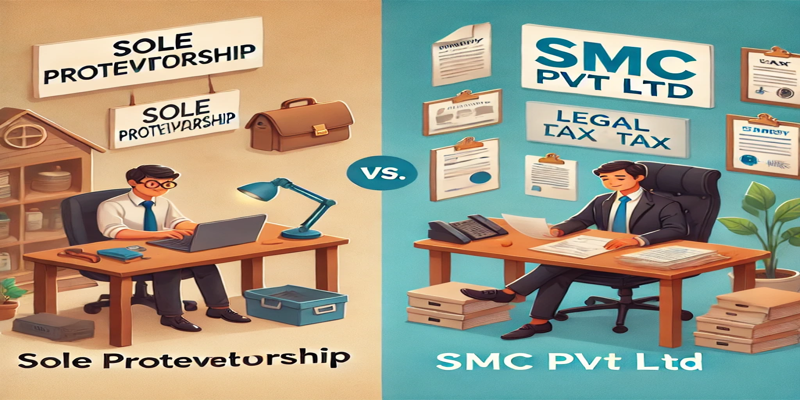In the dynamic landscape of business ownership, choosing the right business structure is critical. Entrepreneurs often find themselves debating between forming a Single Member Company (SMC) Private Limited or operating as a Sole Proprietorship. Each structure has unique features, advantages, and limitations that cater to different business needs. This article provides an in-depth comparison of SMC Pvt Ltd and Sole Proprietorship, aiding entrepreneurs in making informed decisions.
Understanding the Basics
Sole Proprietorship
A Sole Proprietorship is the simplest and most common form of business ownership. It is owned and managed by a single individual who assumes full control, responsibility, and liability for the business.
Key Features:
- Ownership: Single individual owns and manages the business.
- Legal Status: Not a separate legal entity; the owner and the business are the same in the eyes of the law.
- Taxation: Income is taxed as personal income of the owner.
- Liability: Unlimited personal liability.
SMC Pvt Ltd
A Single Member Company Private Limited is a corporate entity designed for sole ownership but operates as a separate legal entity.
Key Features:
- Ownership: Owned by a single individual, but the company is a distinct legal entity.
- Legal Status: Separate from the owner, capable of owning assets, entering contracts, and suing or being sued.
- Taxation: Corporate tax rates apply, distinct from the owner’s personal income.
- Liability: Limited to the extent of the owner’s investment in the company.
Formation and Legal Framework
Sole Proprietorship
The process to establish a Sole Proprietorship is straightforward and involves minimal regulatory compliance. Key steps include:
- Registration: Local business licenses or registration with relevant municipal authorities.
- Tax Registration: Obtaining a tax identification number (TIN) or equivalent.
- Bank Account: Setting up a business bank account under the proprietor’s name.
Legal obligations are minimal, making it an attractive option for small-scale businesses.
SMC Pvt Ltd
Forming an SMC Pvt Ltd involves a more complex process governed by corporate laws. Key steps include:
- Company Name Reservation: Registering a unique name with the corporate regulatory authority.
- Memorandum and Articles of Association: Preparing and filing these foundational documents.
- Capital Requirements: Depositing the minimum required capital.
- Tax Registration: Obtaining a corporate tax identification number.
- Certificate of Incorporation: Issued by the registrar, formalizing the company’s existence.
The process ensures robust governance but involves higher initial costs and regulatory compliance.
Liability and Risk
Sole Proprietorship
The owner bears unlimited liability, meaning personal assets can be used to settle business debts. This poses significant risks, especially in scenarios involving legal disputes or insolvency.
SMC Pvt Ltd
Liability is limited to the company’s assets, shielding the owner’s personal wealth. This structure is ideal for businesses requiring significant investment or exposure to potential liabilities.
Taxation
Sole Proprietorship
Business income is treated as personal income, subject to individual tax rates. This can be advantageous for small-scale operations with modest earnings, as tax slabs may offer lower rates.
SMC Pvt Ltd
The company pays corporate tax on its profits, which may be lower than personal tax rates depending on jurisdiction. However, dividends paid to the owner may incur additional taxes, leading to potential double taxation.
Management and Control
Sole Proprietorship
The owner retains complete control, enabling swift decision-making. This is advantageous for small, flexible businesses but may result in operational inefficiencies as the business grows.
SMC Pvt Ltd
Management follows a structured approach. The owner may act as the sole director, adhering to corporate governance standards. This ensures accountability and transparency but may slow decision-making due to formalities.
Capital and Funding
Sole Proprietorship
Raising capital is limited to the owner’s resources or personal loans. Investors are typically hesitant to fund such businesses due to the lack of a separate legal entity and high-risk profile.
SMC Pvt Ltd
Access to funding is significantly better. The company can issue shares (if allowed) or secure loans using its corporate status, making it a preferred structure for growth-oriented businesses.
Regulatory Compliance
Sole Proprietorship
Compliance requirements are minimal. Annual filings or audits are typically not mandated unless the business exceeds specific revenue thresholds.
SMC Pvt Ltd
The company must adhere to rigorous compliance standards, including:
- Annual financial statements and audits.
- Regular filings with the corporate registrar.
- Board meetings and resolutions.
While these requirements ensure transparency, they increase operational complexity.
Scalability
Sole Proprietorship
Growth potential is limited due to the owner’s finite resources and liability constraints. Transitioning to a more complex structure becomes necessary as the business expands.
SMC Pvt Ltd
The corporate structure facilitates scalability. The company can attract investment, expand operations, and even convert to a multi-member private limited company if needed.
Cost Considerations
Sole Proprietorship
The initial setup and operational costs are low, making it suitable for micro and small enterprises.
SMC Pvt Ltd
Higher costs are involved in incorporation, compliance, and maintenance. However, these costs are justified for businesses with growth ambitions.
Branding and Credibility
Sole Proprietorship
While cost-effective, this structure may lack credibility with investors, partners, and clients due to its informal nature.
SMC Pvt Ltd
The corporate identity enhances credibility, making it easier to build trust and secure contracts with larger organizations.
Succession and Continuity
Sole Proprietorship
The business ceases to exist upon the owner’s death or incapacity, creating challenges for succession planning.
SMC Pvt Ltd
The company’s separate legal identity ensures continuity, even in the absence of the owner. Shares can be transferred, enabling seamless succession.
Choosing the Right Structure
The decision between SMC Pvt Ltd and Sole Proprietorship hinges on the entrepreneur’s goals, resources, and risk tolerance. Consider the following scenarios:
- Opt for Sole Proprietorship if:
- The business is small and localized.
- Minimal regulatory compliance is preferred.
- Limited funding and scalability are acceptable.
- Opt for SMC Pvt Ltd if:
- The business involves significant investment or risk.
- Scalability and access to funding are priorities.
- Compliance with corporate governance enhances credibility.
Conclusion
Both SMC Pvt Ltd and Sole Proprietorship offer unique advantages and challenges. Sole Proprietorship is ideal for small, low-risk ventures due to its simplicity and cost-effectiveness. In contrast, SMC Pvt Ltd provides a robust framework for growth, risk management, and long-term sustainability. Entrepreneurs must carefully evaluate their business goals, financial capacity, and risk appetite to select the structure that best aligns with their vision.


